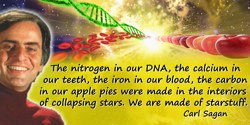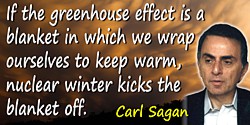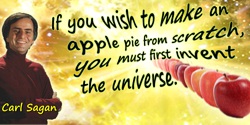 (source)
(source)
|
Carl Sagan
(9 Nov 1934 - 20 Dec 1996)
American astronomer, exobiologist and writer remembered for popularizing astronomy and science, especially with his public television series Cosmos. Its accompanying book spent seventy weeks on The New York Times bestseller list. He was an adviser to NASA for the Mariner, Voyager, and Viking unmanned space missions.
|
Carl Sagan Quotes on Hypothesis (6 quotes)
>> Click for 119 Science Quotes by Carl Sagan
>> Click for Carl Sagan Quotes on | Argument | Contradiction | Cosmos | Experiment | Idea | Knowledge | Life | Nuclear | Religion | Science | Science And Religion | Scientist | Sense | Skepticism | Star | Sun | Test | Thinking | Truth | Universe |
>> Click for 119 Science Quotes by Carl Sagan
>> Click for Carl Sagan Quotes on | Argument | Contradiction | Cosmos | Experiment | Idea | Knowledge | Life | Nuclear | Religion | Science | Science And Religion | Scientist | Sense | Skepticism | Star | Sun | Test | Thinking | Truth | Universe |
...the scientific cast of mind examines the world critically, as if many alternative worlds might exist, as if other things might be here which are not. Then we are forced to ask why what we see is present and not something else. Why are the Sun and moon and the planets spheres? Why not pyramids, or cubes, or dodecahedra? Why not irregular, jumbly shapes? Why so symmetrical, worlds? If you spend any time spinning hypotheses, checking to see whether they make sense, whether they conform to what else we know. Thinking of tests you can pose to substantiate or deflate hypotheses, you will find yourself doing science.
— Carl Sagan
…...
It seems to me what is called for is an exquisite balance between two conflicting needs: the most skeptical scrutiny of all hypotheses that are served up to us and at the same time a great openness to new ideas … If you are only skeptical, then no new ideas make it through to you … On the other hand, if you are open to the point of gullibility and have not an ounce of skeptical sense in you, then you cannot distinguish the useful ideas from the worthless ones.
— Carl Sagan
In 'The Burden of Skepticism', Skeptical Inquirer (Fall 1987), 12, No. 1.
The major religions on the Earth contradict each other left and right. You can’t all be correct. And what if all of you are wrong? It’s a possibility, you know. You must care about the truth, right? Well, the way to winnow through all the differing contentions is to be skeptical. I’m not any more skeptical about your religious beliefs than I am about every new scientific idea I hear about. But in my line of work, they’re called hypotheses, not inspiration and not revelation.
— Carl Sagan
Contact (1997), 162.
There are many hypotheses in science which are wrong. That’s perfectly all right; they’re the aperture to finding out what’s right. Science is a self-correcting process. To be accepted, new ideas must survive the most rigorous standards of evidence and scrutiny.
— Carl Sagan
Quoted in Donald R. Prothero and Carl Dennis Buell, Evolution: What the Fossils Say and Why it Matters (2007), 3.
There is another approach to the extraterrestrial hypothesis of UFO origins. This assessment depends on a large number of factors about which we know little, and a few about which we know literally nothing. I want to make some crude numerical estimate of the probability that we are frequently visited by extraterrestrial beings.
Now, there is a range of hypotheses that can be examined in such a way. Let me give a simple example: Consider the Santa Claus hypothesis, which maintains that, in a period of eight hours or so on December 24-25 of each year, an outsized elf visits one hundred million homes in the United States. This is an interesting and widely discussed hypothesis. Some strong emotions ride on it, and it is argued that at least it does no harm.
We can do some calculations. Suppose that the elf in question spends one second per house. This isn't quite the usual picture—“Ho, Ho, Ho,” and so on—but imagine that he is terribly efficient and very speedy; that would explain why nobody ever sees him very much-only one second per house, after all. With a hundred million houses he has to spend three years just filling stockings. I have assumed he spends no time at all in going from house to house. Even with relativistic reindeer, the time spent in a hundred million houses is three years and not eight hours. This is an example of hypothesis-testing independent of reindeer propulsion mechanisms or debates on the origins of elves. We examine the hypothesis itself, making very straightforward assumptions, and derive a result inconsistent with the hypothesis by many orders of magnitude. We would then suggest that the hypothesis is untenable.
We can make a similar examination, but with greater uncertainty, of the extraterrestrial hypothesis that holds that a wide range of UFOs viewed on the planet Earth are space vehicles from planets of other stars.
Now, there is a range of hypotheses that can be examined in such a way. Let me give a simple example: Consider the Santa Claus hypothesis, which maintains that, in a period of eight hours or so on December 24-25 of each year, an outsized elf visits one hundred million homes in the United States. This is an interesting and widely discussed hypothesis. Some strong emotions ride on it, and it is argued that at least it does no harm.
We can do some calculations. Suppose that the elf in question spends one second per house. This isn't quite the usual picture—“Ho, Ho, Ho,” and so on—but imagine that he is terribly efficient and very speedy; that would explain why nobody ever sees him very much-only one second per house, after all. With a hundred million houses he has to spend three years just filling stockings. I have assumed he spends no time at all in going from house to house. Even with relativistic reindeer, the time spent in a hundred million houses is three years and not eight hours. This is an example of hypothesis-testing independent of reindeer propulsion mechanisms or debates on the origins of elves. We examine the hypothesis itself, making very straightforward assumptions, and derive a result inconsistent with the hypothesis by many orders of magnitude. We would then suggest that the hypothesis is untenable.
We can make a similar examination, but with greater uncertainty, of the extraterrestrial hypothesis that holds that a wide range of UFOs viewed on the planet Earth are space vehicles from planets of other stars.
— Carl Sagan
The Cosmic Connection: An Extraterrestrial Perspective (1973), 200.
Too much openness and you accept every notion, idea, and hypothesis—which is tantamount to knowing nothing. Too much skepticism—especially rejection of new ideas before they are adequately tested—and you're not only unpleasantly grumpy, but also closed to the advance of science. A judicious mix is what we need.
— Carl Sagan
In 'Wonder and Skepticism', Skeptical Enquirer (Jan-Feb 1995), 19, No. 1.
See also:
- 9 Nov - short biography, births, deaths and events on date of Sagan's birth.
- Carl Sagan - context of quote “Advances in medicine and agriculture” - Medium image (500 x 250 px)
- Carl Sagan - context of quote “Advances in medicine and agriculture” - Large image (800 x 400 px)
- Carl Sagan - context of quote A Subject Called Chemistry - Medium image (500 x 350 px)
- Carl Sagan - context of quote A Subject Called Chemistry - Large image (800 x 600 px)
- Carl Sagan: A Life in the Cosmos, by William Poundstone. - book suggestion.
- Booklist for Carl Sagan.






